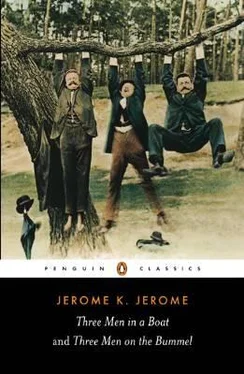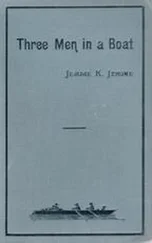Jerome Jerome - Three Men on the Bummel
Здесь есть возможность читать онлайн «Jerome Jerome - Three Men on the Bummel» весь текст электронной книги совершенно бесплатно (целиком полную версию без сокращений). В некоторых случаях можно слушать аудио, скачать через торрент в формате fb2 и присутствует краткое содержание. Жанр: Юмористическая проза, на английском языке. Описание произведения, (предисловие) а так же отзывы посетителей доступны на портале библиотеки ЛибКат.
- Название:Three Men on the Bummel
- Автор:
- Жанр:
- Год:неизвестен
- ISBN:нет данных
- Рейтинг книги:4 / 5. Голосов: 1
-
Избранное:Добавить в избранное
- Отзывы:
-
Ваша оценка:
- 80
- 1
- 2
- 3
- 4
- 5
Three Men on the Bummel: краткое содержание, описание и аннотация
Предлагаем к чтению аннотацию, описание, краткое содержание или предисловие (зависит от того, что написал сам автор книги «Three Men on the Bummel»). Если вы не нашли необходимую информацию о книге — напишите в комментариях, мы постараемся отыскать её.
Three Men on the Bummel — читать онлайн бесплатно полную книгу (весь текст) целиком
Ниже представлен текст книги, разбитый по страницам. Система сохранения места последней прочитанной страницы, позволяет с удобством читать онлайн бесплатно книгу «Three Men on the Bummel», без необходимости каждый раз заново искать на чём Вы остановились. Поставьте закладку, и сможете в любой момент перейти на страницу, на которой закончили чтение.
Интервал:
Закладка:
The whole interest is centred in watching the wounds. They come always in one of two places-on the top of the head or the left side of the face. Sometimes a portion of hairy scalp or section of cheek flies up into the air, to be carefully preserved in an envelope by its proud possessor, or, strictly speaking, its proud former possessor, and shown round on convivial evenings; and from every wound, of course, flows a plentiful stream of blood. It splashes doctors, seconds, and spectators; it sprinkles ceiling and walls; it saturates the fighters, and makes pools for itself in the sawdust. At the end of each round the doctors rush up, and with hands already dripping with blood press together the gaping wounds, dabbing them with little balls of wet cotton wool, which an attendant carries ready on a plate. Naturally, the moment the men stand up again and commence work, the blood gushes out again, half blinding them, and rendering the ground beneath them slippery. Now and then you see a man's teeth laid bare almost to the ear, so that for the rest of the duel he appears to be grinning at one half of the spectators, his other side, remaining serious; and sometimes a man's nose gets slit, which gives to him as he fights a singularly supercilious air.
As the object of each student is to go away from the University bearing as many scars as possible, I doubt if any particular pains are taken to guard, even to the small extent such method of fighting can allow. The real victor is he who comes out with the greatest number of wounds; he who then, stitched and patched almost to unrecognition as a human being, can promenade for the next month, the envy of the German youth, the admiration of the German maiden. He who obtains only a few unimportant wounds retires sulky and disappointed.
But the actual fighting is only the beginning of the fun. The second act of the spectacle takes place in the dressing-room. The doctors are generally mere medical students-young fellows who, having taken their degree, are anxious for practice. Truth compels me to say that those with whom I came in contact were coarse— looking men who seemed rather to relish their work. Perhaps they are not to be blamed for this. It is part of the system that as much further punishment as possible must be inflicted by the doctor, and the ideal medical man might hardly care for such job. How the student bears the dressing of his wounds is as important as how he receives them. Every operation has to be performed as brutally as may be, and his companions carefully watch him during the process to see that he goes through it with an appearance of peace and enjoyment. A clean-cut wound that gapes wide is most desired by all parties. On purpose it is sewn up clumsily, with the hope that by this means the scar will last a lifetime. Such a wound, judiciously mauled and interfered with during the week afterwards, can generally be reckoned on to secure its fortunate possessor a wife with a dowry of five figures at the least.
These are the general bi-weekly Mensurs, of which the average student fights some dozen a year. There are others to which visitors are not admitted. When a student is considered to have disgraced himself by some slight involuntary movement of the head or body while fighting, then he can only regain his position by standing up to the best swordsman in his Korps. He demands and is accorded, not a contest, but a punishment. His opponent then proceeds to inflict as many and as bloody wounds as can be taken. The object of the victim is to show his comrades that he can stand still while his head is half sliced from his skull.
Whether anything can properly be said in favour of the German Mensur I am doubtful; but if so it concerns only the two combatants. Upon the spectators it can and does, I am convinced, exercise nothing but evil. I know myself sufficiently well to be sure I am not of an unusually bloodthirsty disposition. The effect it had upon me can only be the usual effect. At first, before the actual work commenced, my sensation was curiosity mingled with anxiety as to how the sight would trouble me, though some slight acquaintance with dissecting-rooms and operating tables left me less doubt on that point than I might otherwise have felt. As the blood began to flow, and nerves and muscles to be laid bare, I experienced a mingling of disgust and pity. But with the second duel, I must confess, my finer feelings began to disappear; and by the time the third was well upon its way, and the room heavy with the curious hot odour of blood, I began, as the American expression is, to see things red.
I wanted more. I looked from face to face surrounding me, and in most of them I found reflected undoubtedly my own sensations. If it be a good thing to excite this blood thirst in the modern man, then the Mensur is a useful institution. But is it a good thing? We prate about our civilisation and humanity, but those of us who do not carry hypocrisy to the length of self-deception know that underneath our starched shirts there lurks the savage, with all his savage instincts untouched. Occasionally he may be wanted, but we never need fear his dying out. On the other hand, it seems unwise to over-nourish him.
In favour of the duel, seriously considered, there are many points to be urged. But the Mensur serves no good purpose whatever. It is childishness, and the fact of its being a cruel and brutal game makes it none the less childish. Wounds have no intrinsic value of their own; it is the cause that dignifies them, not their size. William Tell is rightly one of the heroes of the world; but what should we think of the members of a club of fathers, formed with the object of meeting twice a week to shoot apples from their sons' heads with cross-bows? These young German gentlemen could obtain all the results of which they are so proud by teasing a wild cat! To join a society for the mere purpose of getting yourself hacked about reduces a man to the intellectual level of a dancing Dervish. Travellers tell us of savages in Central Africa who express their feelings on festive occasions by jumping about and slashing themselves. But there is no need for Europe to imitate them. The Mensur is, in fact, the reductio ad absurdum of the duel; and if the Germans themselves cannot see that it is funny, one can only regret their lack of humour.
But though one may be unable to agree with the public opinion that supports and commands the Mensur, it at least is possible to understand. The University code that, if it does not encourage it, at least condones drunkenness, is more difficult to treat argumentatively. All German students do not get drunk; in fact, the majority are sober, if not industrious. But the minority, whose claim to be representative is freely admitted, are only saved from perpetual inebriety by ability, acquired at some cost, to swill half the day and all the night, while retaining to some extent their five senses. It does not affect all alike, but it is common in any University town to see a young man not yet twenty with the figure of a Falstaff and the complexion of a Rubens Bacchus. That the German maiden can be fascinated with a face, cut and gashed till it suggests having been made out of odd materials that never could have fitted, is a proved fact. But surely there can be no attraction about a blotched and bloated skin and a "bay window" thrown out to an extent threatening to overbalance the whole structure. Yet what else can be expected, when the youngster starts his beer-drinking with a "Fruhschoppen" at 10 a.m., and closes it with a "Kneipe" at four in the morning?
The Kneipe is what we should call a stag party, and can be very harmless or very rowdy, according to its composition. One man invites his fellow-students, a dozen or a hundred, to a cafe, and provides them with as much beer and as many cheap cigars as their own sense of health and comfort may dictate, or the host may be the Korps itself. Here, as everywhere, you observe the German sense of discipline and order. As each new comer enters all those sitting round the table rise, and with heels close together salute. When the table is complete, a chairman is chosen, whose duty it is to give out the number of the songs. Printed books of these songs, one to each two men, lie round the table. The chairman gives out number twenty-nine. "First verse," he cries, and away all go, each two men holding a book between them exactly as two people might hold a hymn-book in church. There is a pause at the end of each verse until the chairman starts the company on the next. As every German is a trained singer, and as most of them have fair voices, the general effect is striking.
Читать дальшеИнтервал:
Закладка:
Похожие книги на «Three Men on the Bummel»
Представляем Вашему вниманию похожие книги на «Three Men on the Bummel» списком для выбора. Мы отобрали схожую по названию и смыслу литературу в надежде предоставить читателям больше вариантов отыскать новые, интересные, ещё непрочитанные произведения.
Обсуждение, отзывы о книге «Three Men on the Bummel» и просто собственные мнения читателей. Оставьте ваши комментарии, напишите, что Вы думаете о произведении, его смысле или главных героях. Укажите что конкретно понравилось, а что нет, и почему Вы так считаете.










